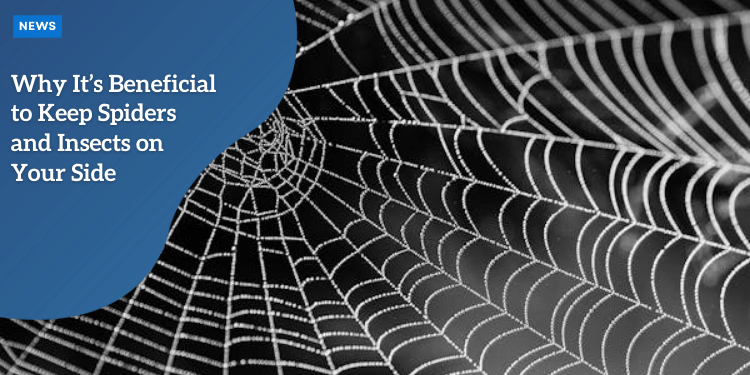Why It’s Beneficial to Keep Spiders and Insects on Your Side

Anúncios
When the thought of a house filled with spiders and insects comes to mind, it’s usually accompanied by a shudder.
However, having a carefully chosen selection of these creatures around your home can bring significant benefits.
Sarah Bonney, a PhD candidate at Charles Darwin University and the organizer of the Darwin Insect Festival, suggests that insects and invertebrates are often misunderstood and given an undeserved bad reputation.
“Insects actually play a very big role in our world,” she states.
Anúncios
While these tiny creatures work tirelessly to maintain environmental equilibrium, they also offer unexpected advantages for our homes and gardens.
The Importance of Understanding Beneficial Bugs
The fact is, there are numerous species of insects and invertebrates that can exist both inside and outside your home.
Spiders, in particular, serve as effective natural pest controllers.
Their presence can help manage and reduce the population of harmful insects.
Anúncios
If one can accept cohabitating with spiders, these eight-legged housemates can be quite beneficial.
Carnivorous Insects: Nature’s Pest Controllers
Among the most advantageous insects to have around the home are those that feed on other insects.
Encouraging these carnivorous insects to thrive can be surprisingly straightforward and involves less human intervention in the natural ecosystem.
“Try not to use too many pesticides to kill unwanted insects,” advises Ms. Bonney.
“The problem with pesticides is that they affect beneficial insects just as badly, if not worse, than the harmful ones.”
Carnivorous or predatory insects in the garden are particularly adept at controlling pest species that may otherwise damage plants.
According to Dr. Lowe, “Praying mantises are absolutely fascinating insects.
They are highly skilled predators fantastic at catching bugs, flies, beetles, and all sorts of other pests that can harm your plants.”
Additionally, lady beetles, often celebrated for their attractive appearance, are also proficient predators.
These insects can help reduce the population of aphids and other plant-eating pests.
The Unsung Heroes: Flies in the Ecosystem
While having swarms of flies inside the home is far from ideal, they play a crucial role in nature when they are outside.
Ms. Bonney points out that flies act as the “world’s pooper-scoopers,” breaking down organic material and returning essential nutrients to the ecosystem.
Dr. Lowe adds another perspective on the role of flies around the home.
“To me, the most important role of flies is in the food web,” she explains.
“They serve as a crucial food supply for numerous insects and spiders.
Without flies in the ecosystem, many species would suffer from lack of food, disrupting the entire food chain.”
The Ecological Impact of Maintaining Insect Populations
The ecological balance hinges on the presence and activities of various insects.
Removing or reducing their populations through excessive pesticide use can have far-reaching consequences.
By allowing beneficial insects to thrive, one can enjoy a healthier garden and reduce the incidence of harmful pests naturally.
Spiders are renowned for their pest control abilities.
They feed on a variety of insects, many of which can be harmful to crops and garden plants.
By keeping spider populations healthy, one can indirectly protect the garden from harmful pests.
Lady beetles are yet another group of beneficial insects.
Known for their diet that includes aphids, mites, and other small pests, these beetles help reduce the need for chemical pest control methods.
Toward a Pesticide-Free Garden
Creating a pesticide-free garden involves encouraging the natural predators of harmful pests to establish themselves.
This can be achieved through several methods:
- Planting a diverse range of plants: This attracts different beneficial insects by providing varied habitats and food sources.
- Providing water sources: Small water features or even simple water bowls can help attract predators like dragonflies and lady beetles.
- Minimizing pesticide use: Allowing natural predators to manage pests reduces the need for chemical interventions.
By fostering an environment where beneficial insects can thrive, the garden’s ecosystem becomes more resilient and self-sustaining.
The Role of Education and Awareness
Education is paramount in changing the public’s perception of insects and invertebrates.
Initiatives like the Darwin Insect Festival, organized by Ms. Bonney, play a significant role in educating people about the benefits of these creatures.
Through education, misconceptions about insects can be corrected, and a greater appreciation for their ecological roles can be encouraged.
The Grass-Roots Movement Toward Biodiversity
Supporting native insect populations isn’t just an ecological concern but also a social one.
Grass-roots movements and community-driven initiatives focused on biodiversity can make a significant impact.
Community gardens, local educational programs, and public awareness campaigns can collectively drive the message home that insects are not adversaries but allies in our endeavor to maintain balanced ecosystems.
Practical Steps for Coexisting with Beneficial Insects
For those who wish to take a practical approach to coexist with beneficial insects, several steps can be followed:
- Create Insect Habitats: Building insect hotels or leaving garden debris for beneficial insects to shelter can be beneficial.
- Plant Native Flora: Native plants are more likely to attract and support local insect populations.
- Educate Household Members: Bringing awareness to family members about the benefits of having certain insects in and around the home can foster a harmonious living environment.
Embracing the Benefits
The nuanced role that insects play in our ecosystems cannot be overstated.
By realigning our attitudes and practices concerning these creatures, we stand to gain immense benefits.
From reduced pests to enriched soils, the advantages are clear. And though it may require a shift in perspective, the positive environmental outcomes make it a worthwhile endeavor.
Conclusion: Living Harmoniously with Insects
In conclusion, while the initial idea of sharing living spaces with spiders and insects might cause discomfort, understanding their role and benefits can lead to a more harmonious coexistence.
Their presence aids in natural pest control, contributes to the health of our soils, and plays a vital role in the ecosystem.
Education and awareness are essential for changing perceptions and embracing the advantages that these creatures bring.
By reducing pesticide use, creating welcoming environments for beneficial insects, and fostering community initiatives, we can enjoy the full spectrum of benefits they offer.
Ultimately, welcoming spiders and insects into our homes and gardens isn’t about merely tolerating their presence; it’s about recognizing and valuing the indispensable roles they play in the grand scheme of our natural world.
Embracing this new understanding can lead to healthier living, both for humans and the environment, forming a sustainable path forward.






